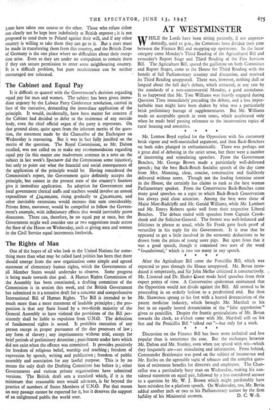The Cabinet and Equal Pay
It is difficult to quarrel with the Government's decision regarding equal pay for men and women. The subject has been given imme- diate urgency by the Labour Party Conference resolution, carried in face of the executive, demanding the immediate application of the principle. It would, incidentally, have been matter for concern if the Cabinet had decided to defer to the insistence of any outside body, even the chief official organ of the party it represents. On that ground alone, quite apart from the inherent merits of the ques- tion, the statement made by the Chancellor of the Exchequer on Wednesday is reassuring. But it was in fact fully justified on the merits of the question. The Royal Commission, as Mr. Dalton recalled, was not called on to make any recommendation regarding equal pay (in this matter one inadvertent sentence in a note on the subject in last week's Spectator did the Commission some injustice), but only to point out what the financial and social consequences of the application of the principle would be. Having considered the Commission's report, the Government quite definitely accepts the principle, but cannot in the present state of the country's finances give it immediate application. Its adoption for Government and local government clerical staffs and teachers would involve an annual expenditure of L24,000,00o, rising gradually to £3o,000,000, and other inevitable extensions .would increase that sum considerably. Private firms, moreover, would be compelled to follow the Govern- ment's example, with inflationary effects that would inevitably prove disastrous. There can, therefore, be no equal pay at once, but the Government might well consider one or two suggestions made across the floor of the House on Wednesday, such as giving men and women in the Civil Service equal increments forthwith.


































 Previous page
Previous page